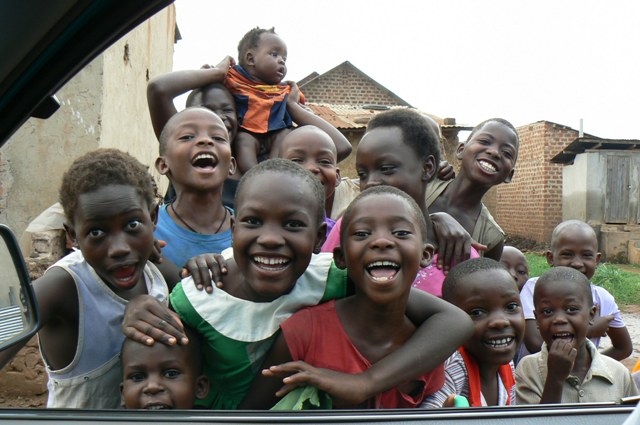Earlier development:
2015: ICDP at Nyenga Foundation
In 2015, ICDP started to make plas with the Nyenga Foundation for ICDP development in Jinja, Uganda. Homepage is www.nyenga.no
About the Nyenga Foundation: The foundation runs a home for orphaned children, and also has a health center and a school. Their goal is “promoting sustainable growth through empowering individuals, families and communities”. The work started in 2009 when they decided to build a home for orphans. There are now 23 orphans at the home with 23 Ugandan employees. In order to provide health services to the orphaned children, a health center was built in July 2011. It has saved many lives since. They provide treatment for chidlren, immunizations, conduct laboratory tests for malaria and other diseases, offer maternity services, counseling and training. In 2012, they opened the New Horizon primary school that focuses on teaching practical knowledge to approximately 160 children. The school motto is “learning for self-reliance”. In addition, the Nyenga Foundation promotes small-scale businesses and one of the services on offer is microfinance loans and assistance in establishing new workplaces. Stiftelsen Nyenga Norge supports the work of the Nyenga Foundation. A network of volunteers and a dedicated board in Norway makes it possible to run Nyenga without a costly administration. Their sponsors are schools, individuals, families and companies, mainly in Norway, but also some within Uganda.
“The leadership of Nyenga have shown great interest to fully embrace the ICDP methodology in their valuable work for orphaned children and their enthusiasm has made the cooperation with ICDP easy and engaging. ICDP is committed to do our best to support them.” – Nicoletta Armstrong, ICDP chair.
Developments in 2014:
At the beginning of 2014, Daniel Wight, an anthropologist from the University of Glasgow, established contact with Nicoletta Armstrong, the ICDP chair, expressing interest in using the ICDP programme and materials in the project that is starting to develop in Uganda. They agreed on a plan of action concerning the training of a local group to become ICDP facilitators.
The facilitators were to apply the ICDP programme with families in the communities selected by the Uganda project. The ICDP trainer for the Uganda project is Verynice Fredrick, who in April held the first workshop for facilitators, that took place in Kampala.
The cooperating project partners are:
MRC/CSO Social and Public
Health Sciences Unit, University of Glasgow; Child Health and
Development Centre, Makerere University; Mothers’ Union of Anglican
Church, Uganda and MRC/UVRI Uganda Research Unit on AIDS.
The project will be developed over a period of 32 month. It aims to design and pilot a community based parenting programme for the early prevention of sexual and gender based violence (GBV). This initiative is funded by the South African Sexual Violence Research Initiative and the Bernard van Leer Foundation. The programme aims to address four familial processes associated with GBV: poor parental bonding and child attachment; harsh parenting and corporal punishment; differential socialisation by gender and parental conflict.
Two underlying and interrelated principles are to harness the target group’s existing motivation and to maximize participation, especially through solution focused discussion.
Parents in rural east Africa are particularly concerned about children’s good behaviour and respect, which is a hallmark of family respectability. Many government and NGO initiatives around Children’s Rights are resisted because they are perceived to undermine children’s good behaviour. This programme will emphasize that responsive, non harsh parenting leads to better outcomes for children and does not undermine children’s good behaviour or respect for their parents. The provisional title is: Parenting for Good Behaviour and Respectability. The programme’s structure is flexible enough to incorporate key parenting concerns of the target group. The ICDP approach to: “Start with what they know, build with what they have.” (Lao Tsu 700 B.C), will be followed within sessions. The intervention will be also building on a model pioneered by the Mothers’ Union.
The project will be a 20 session community-based participatory parenting programme facilitated by two local parents. They will receive two weeks’ residential training, but beyond that the programme will be voluntary. The first 10 sessions will be with run with mothers and fathers separately. Drawing on Stepping Stones methodology, the two groups will be brought together for sessions 11-20 and encouraged to address conflicting gendered perceptions of parenting problems.
There are four main theories underlying the intended mechanisms of the programme. First, according to attachment theory secure attachment and parental responsiveness are critical for children’s confidence, emotional regulation, empathy and cognitive development. Second, parents’ positive behavioural control can promote children’s emotional control, cooperation and affection for parents. Third, according to Social Learning Theory new behaviours are learnt through modelling behaviour, by demonstration or being taught. Finally, differential socialisation from early childhood is a key factor perpetuating gender inequalities.
The content of the 20 sessions is likely to include:
• Introduction to importance of parent-child interactions from birth
• Introduction to main stages of child development
• Practical ways of developing close bonds with children
• Strengthening family relationships
• Achieving good behaviour without corporal punishment
• Retaining authority while respecting Children’s Rights
• Encouraging child at school
• Analysis of structural factors shaping gendered power and individual beliefs and practices
• Challenging harmful norms of gender socialization
• Resolving disputes with one’s spouse
• Encouraging men’s involvement in family life and children’s futures
• Advocacy of positive, respectable, notions of masculinity
Three stages in developing the programme: 1) the development of the programme and manual; 2) a formative evaluation with four groups in Wakiso District, Uganda; and 3) a large scale pilot with before and after outcome evaluation. If the results prove promising funding will be sought for a randomised controlled trial.

